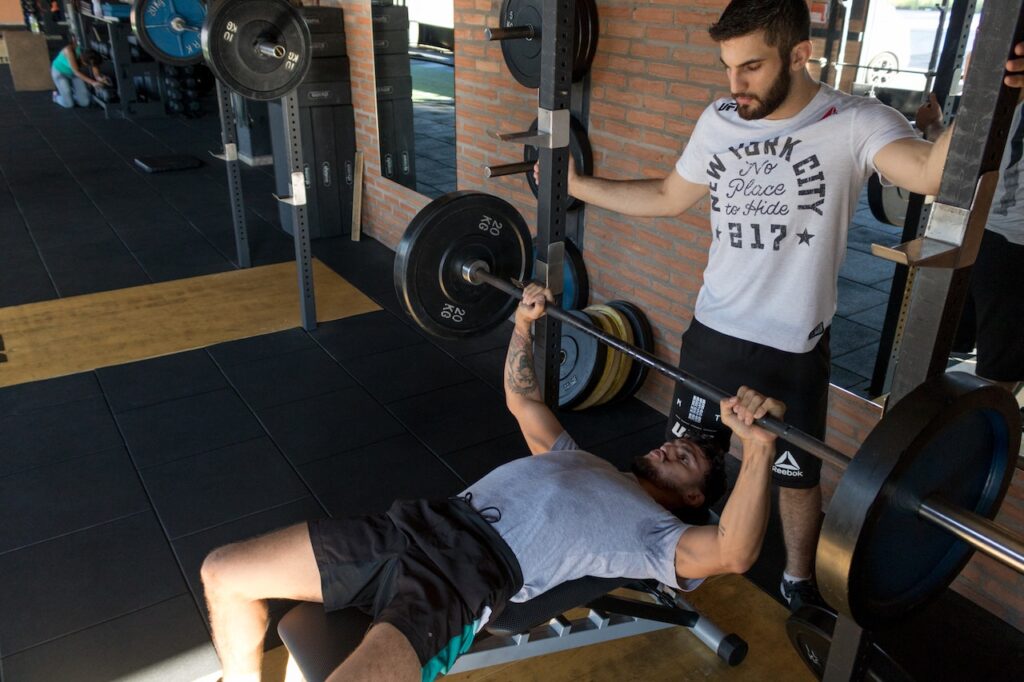by JTwisdom | Oct 21, 2025 | Fitness, Lifestyle |
CDC data suggests that over 50 million people experience chronic pain every year in the US. Physical pain can take its toll on your mental and emotional well-being, as well as making even the most basic everyday activities more challenging. If you’re dealing with pain, this guide contains proactive tips to help you cope.
 Image credit:
Image credit:
Seek medical advice
The first thing to do if you experience long-term pain or symptoms that are getting worse is to seek medical advice. Whether you’re recovering from an accident or injury, or you’ve had pain for months with no obvious cause, it’s wise to get checked out. Sometimes, it’s not possible to pinpoint an underlying cause, but often, it’s possible to diagnose and cure health conditions or utilize treatments to manage symptoms. The healthcare professionals you see will depend on the severity of your condition, your symptoms, your health status, and your treatment preferences. You may be advised to wait and see if your symptoms improve or try physical therapy, or you may be referred for specialist treatment, such as a surgical procedure.
Explore pain relief solutions
There are multiple treatments, therapies, and solutions you can try to alleviate or eliminate pain. It’s important to understand that everyone is different, and certain measures or methods recommended by others may not work for you. You may need to try a range of products or therapies to find something that is effective. In recent years, pain support with CBD & THC has become more common. CBD is generally recommended for helping people feel more relaxed and easing acute symptoms of discomfort, while THC can be beneficial for chronic pain. Ice and heat therapy, massage, and targeted exercises can also reduce pain. It’s beneficial to seek advice from your doctor or a professional, such as a physical therapist, before trying new treatments or supplements.
Try distraction techniques
We often experience heightened symptoms of pain when we stop. It’s common to be more mindful of pain when you try to get to sleep or you sit and rest after work. Distraction techniques take your mind off the symptoms you’re experiencing, providing a new focal point. You may decide to call a friend, watch TV, listen to music, go for a gentle walk, spend time outside, do a puzzle, or play online games, for example. Some hobbies or activities may be more effective than others. Figure out what works for you and try to keep busy without giving yourself too much to do or think about.
Developing coping mechanisms
If you live with chronic pain, you will probably endure good and bad days. When your pain intensifies, it’s helpful to use coping mechanisms to help you manage. You can try self-help techniques or explore therapies, such as CBT (cognitive behavioral therapy). Examples include exercise, meditation, being in nature, and talking to a therapist, friend, family member, or partner.
Millions of people experience chronic pain every year. In many cases, there are no quick fixes, but there are steps you can take to try to manage symptoms and protect your mental health. Examples include seeking medical advice, exploring pain relief solutions, trying distraction techniques, and employing coping mechanisms.
by JTwisdom | Aug 14, 2024 | Fitness, From the Heart |
Stress has become an unwelcome companion in the lives of many in today’s fast-paced world. You might feel its unwelcome presence in various facets of life, from work to personal finances. This guide is your compass to navigate these turbulent experiences, offering practical strategies to identify and mitigate stressors. You can reclaim a sense of calm and control in your life by implementing these techniques.
 Image by 8photo on Freepik
Image by 8photo on Freepik
Unraveling the Underlying Causes of Your Stress
Understanding the root causes of your stress is crucial. Take time to introspect and pinpoint the specific sources of your anxiety. Recognizing these triggers is your first step toward managing them effectively, whether it’s a looming deadline or a personal conflict. Doing so will equip you with the knowledge to tackle these stressors head-on.
Cultivating Calm in the Midst of Turmoil
Incorporating mindfulness into your daily life can transform how you respond to stress. Techniques like deep breathing exercises and meditation provide a sanctuary of calm. When stress waves threaten to overwhelm you, these practices serve as an anchor, helping you remain composed and focused.
Navigating the Entrepreneurial Seas
Alleviating stress from work is essential for maintaining your well-being. If you’re in a job that’s too stressful and ready for a career change, consider starting your own business. A well-designed logo for your business can make a solid first impression and build brand awareness. If you’re on a tight budget, instead of paying for logo design services, you can use an online logo maker to design an appealing and creative logo. Simply choose a style and icon, add any text you need, and use the logo generator to view an assortment of logos. You can then adjust the fonts and colors to match your brand.
Boundaries as a Beacon
Establishing clear boundaries is paramount in reducing stress. Whether it’s saying no to extra work assignments or carving out time for self-care, boundaries help maintain a healthy balance. Identify areas where boundaries are lacking in your life and take steps to assert them. This not only reduces stress but also fosters self-respect and healthy relationships.
Shared Experiences in Stress Relief
Never underestimate the power of a supportive network. Talking to friends, family, or a professional about your stress can provide new perspectives and solutions. They can remind you that you’re not alone in your struggles and that help is always available. Sharing your concerns can lighten your emotional load and bring comfort. It can also open the door to advice and coping strategies that you might not have considered.
Mitigating Life’s Inevitable Stressors
While not all stressors can be avoided, minimizing your exposure to them can have a significant impact. In unavoidable situations, practicing acceptance can be a powerful tool for mitigating stress. Recognizing what you can and cannot control is vital in this process. Acceptance doesn’t mean resignation to stress’s effects but rather understanding and adapting to reality. This mindset shift can significantly reduce feelings of helplessness and frustration.
The Revitalizing Power of Physical Activity
Incorporating regular physical activity into your routine is a proven stress reliever. Whether it’s a brisk walk, a yoga session, or a workout at the gym, exercise releases endorphins — the body’s natural mood lifters. If you’re looking for a way to track your physical activity and stay motivated, consider using a fitness tracker. It’s a powerful tool to help you monitor your progress, set goals, and maintain a consistent exercise routine. Consistent physical activity improves physical health while enhancing mental clarity and emotional resilience. Think of it as an effective way to break the cycle of stress and recharge your energy levels.
Stress need not be a permanent fixture in your life, and you can significantly reduce its impact by adopting these strategies. Remember that managing stress is a journey, not a destination. With each step you take using these techniques, you move closer to a more balanced and serene life. Embrace these practices and watch your world become more peaceful and manageable.
by | May 1, 2023 | Fitness |
Throughout our lives, we are exposed to a variety of environmental pollutants, toxins in food and water, and synthetic chemicals that accumulate in our bodies over time. The burden of these substances can lead to poor health outcomes, including fatigue, headaches, digestive issues, skin problems, and more.
Luckily, your body has an amazing system for cleansing itself of these toxins—it’s called detoxification. Below, we will examine the process of detoxification and how it works to protect our health.
The Detoxification Process
Detoxification is a complex process that involves several organs throughout your body working together in order to rid itself of harmful toxins. The primary organs involved in this process are the liver, kidney, lungs, and the skin. In brief, here is how each organ helps with the detoxification process:
Liver: The liver plays the starring role in detoxifying your body by filtering out harmful substances from your bloodstream and converting them into harmless materials, which can be eliminated through urine or stools. It is here that the liver breaks down toxic substances such as alcohol, drugs, and chemicals.
Kidneys: The kidneys help eliminate toxins through urine by filtering out waste materials in the bloodstream. They also regulate electrolytes, pH levels, salt concentrations, and other important compounds in your body to ensure proper bodily function.
Lungs: Your lungs expel toxins from your body when you exhale carbon dioxide (CO2). This process helps to reduce the buildup of these toxins in your system. Additionally, some people choose to participate in detoxification programs that involve deep breathing exercises for further detoxification purposes.
Skin: The skin is often overlooked when discussing organs involved with detoxification; however, it plays an essential role in the process. The skin allows for the elimination of toxins through sweat, as well as providing a barrier from environmental pollutants.
Detoxification Benefits
When your body is able to effectively detoxify itself, it helps you feel your best and prevents illnesses due to an accumulation of toxins. By removing these substances from your system, you may enjoy improved digestion, clearer skin, and more energy overall.
Additionally, some research suggests that regular detoxification can help reduce inflammation which has been linked to many chronic health conditions such as arthritis and cancer.
Ways to Support Detoxification
There are several lifestyle modifications you can make in order to support healthy detoxification functions in your body:
Drink detoxifying juices: Green juices and detoxifying beet juice are excellent sources of vitamins, minerals, and antioxidants that can help your body flush out toxins.
Eat a clean diet: Eating a balanced diet rich in lean proteins, fresh fruits and vegetables, and healthy fats helps to ensure your body is getting the nutritional support it needs for proper detoxification.
Exercise regularly: Regular exercise helps to sweat out toxins from the skin as well as promote healthy circulation throughout the body, which aids in eliminating toxins through the kidneys.
Reduce stress: High levels of stress can impede your body’s natural ability to detoxify itself. Make sure you take time every day to relax and unwind in order to reduce stress hormones.
Avoid pollutants: Reducing your exposure to air and water pollutants is beneficial for your health and can help reduce the amount of toxins entering your body.
Sauna or Epsom salt bath: Saunas are an effective way to sweat out toxins and promote healthy circulation, while an Epsom salt bath can help draw toxins out of your body through your skin.
Get adequate sleep: Sleep is essential for your body to repair and reset itself. Make sure you are getting at least 7-8 hours of uninterrupted sleep each night.
Take supplements: Certain supplements may help to support your liver’s natural detoxification process and boost your body’s ability to eliminate toxins. Look for supplements that contain ingredients such as milk thistle, dandelion root extract, and glutathione that may assist with detoxification.
Hydrate: Drink plenty of water throughout the day to help flush out toxins. Additionally, you can add some lemon and a pinch of sea salt to your water. It usually helps to improve the detoxification process.
There are also several professional programs available for those who wish to further support their bodies’ detoxification processes which include medically supervised detox treatments or juice fasting programs; however, these should only be attempted under a doctor’s supervision.
Regardless, you can ensure your long-term health and well-being by understanding the detoxification process and what you can do to help your body naturally eliminate toxins.
by | Feb 23, 2023 | Fitness |
Are you looking to reach your fitness goals but feel stuck and unsure of the right path? A personal trainer could be the perfect solution for you! With a personal trainer, you can unlock your potential and reach your goals safely and effectively. Personal trainers such as Elite Training are experts in the field who will work with you to create a tailor-made program that suits your specific needs and goals. With their guidance and motivation, you can discover the benefits of a personal training program and finally get the desired results. So, if you are ready to reach your fitness goals, it’s time to unlock your potential with a personal trainer.

Image credit
They Can Help to Perfect Your Form
One of the most essential benefits of having a personal trainer is that they can help you develop and perfect your form. Proper form is critical for avoiding injury and achieving the best results from your workout. But it can be challenging to know if you are doing an exercise correctly, especially if you are a beginner. Your personal trainer can guide you and ensure you perform each exercise perfectly.
They can provide you with simple adjustments, such as posture and alignment, to help you maximize your performance. They can also provide feedback and make corrections, if needed, to help you get the most out of your workout. As a result, you can reach your goals faster and more safely.
You Get a More Personalized Workout to Meet Your Needs and Goals
Another great benefit of working with a personal trainer is getting a more personalized workout. Personal trainers have the knowledge and experience to create a workout plan tailored to your needs and goals. This can be incredibly beneficial, as it means you are not wasting time on exercises that are not helping you reach your goals.
Your personal trainer can also assess your progress and modify your program as needed. This can help you stay on track and maximize your workouts. Additionally, your personal trainer can provide advice and guidance to help you reach your goals faster and more effectively.
Motivation and Dedication
A personal trainer can give you the motivation and dedication to reach your goals. Staying motivated and committed to your workouts can be hard, especially if you are doing them alone. But with a personal trainer by your side, you can stay focused and motivated to reach your goals.
Your personal trainer will also provide you with constant motivation and encouragement. They can help you stay on track and push yourself to reach your goals. This can be incredibly beneficial, as it can help you stay motivated and dedicated to your workouts.
They Can Keep You Accountable
Finally, having a personal trainer can keep you accountable. It can be hard to stay motivated and on track with your workouts, but with a personal trainer, you have someone to answer to. If you miss a workout, they will be there to hold you accountable and help you get back on track.
Your personal trainer will also provide feedback and help you focus on your goals. They can help you stay motivated and on track, ensuring you get the most out of your workouts. As a result, you can consistently reach your goals and remain dedicated to your program.
Conclusion
Overall, having a personal trainer can be incredibly beneficial for reaching your fitness goals. With their help, you can perfect your form, get a personalized workout tailored to your needs and goals, stay motivated and dedicated, and stay accountable. So, if you are ready to reach your fitness goals, it’s time to unlock your potential with a personal trainer.
by | Oct 7, 2022 | Fitness, Lifestyle |
Getting back to work after an accident is pretty much what most of us want to do. It’s not good to do nothing but sit around. But you have to know how the process works and how to heal.
Understand the Healing Process
Healing is a process that involves both the body and the mind. Physically, red blood cells help make collagen to build new tissue. Emotional healing is the process of accepting and working through painful experiences. Any injury can cause physical and emotional scars that take time to mend. Fortunately, you can seek legal counsel if something isn’t your fault. This injury lawyer facebook page outlines what to do. Finding who is at fault can accelerate the healing process.

Woman with a broken leg on the couch – Image Courtesy of Pexels
Compression and Elevation
Compression and elevation are usually the first fundamental steps of physical healing. When your hurt part is raised, the blood vessels’ pressure goes down, which helps stop the bleeding. It also speeds up the flow of inflammatory fluid through your lymph vessels, which reduces swelling. With compression, swelling goes down and makes circulation better. Pressure helps keep blood from pooling in the veins, while the increased blood flow helps the body heal.
Protein Helps You Get Back to Work After an Accident
Protein is associated with working out. The reason is it helps repair muscle damage faster and more efficiently. So you can use proteins when you are injured. Some benefits of protein are:
– Protein helps build more soft muscle tissue to speed up the healing process.
– Certain proteins assist with stabilizing the inflammation of an injury.
– You can also reduce the effects of lost muscle mass because of being immobile.
Protein makes your muscles stronger. You will lose muscle mass when you get injured and can’t move. You can significantly reduce this by eating enough protein-rich foods in recovery.
Vitamin C and D Provide Multiple Benefits
Vitamins C and D are essential vitamins in life. But they can be a great help when you are injured. Vitamin C makes collagen in your body, which helps keep your muscles and tendons in good shape. It’s also essential for healing cuts and wounds and reducing infection chances. Vitamin D is required for increased bone density and strength. But it can also help your muscles recover faster after injury and may even keep them from getting hurt in the first place.
Calcium and Omega-3 Fatty Acids
Calcium is vital for bone health. However, its ions also start and control how the central nervous system reacts to damage in terms of pain signals. Studies have also shown that using calcium can cut stress fractures by 20%. In addition, omega-3 fatty acids can help you keep from losing muscle when you don’t use them, like when you’re hurt and can’t use your muscles. They also have anti-inflammatory properties and could be used to treat autoimmune diseases.
Summary
Various tools are at your disposal when returning to work after an accident. But first, you need to know how it works. Then you can fix things with proteins and other minerals.
by | Apr 17, 2022 | Fitness |
When you work out, your muscles go through a lot of stress. It is essential to allow them time to recover to become stronger. If you don’t give your body enough time to rest and recover, you might not see the results that you’re hoping for. This article will discuss the importance of recovery and how it can help improve your overall fitness level.

Photo by Li Sun from Pexels
Why Is Recovery Important?
Recovery is significant because it allows your muscles to repair and become stronger. When you work out, you create tiny tears in your muscle fibers. These tears are what cause your muscles to grow back bigger and stronger. However, your body can only repair these tears if it has the time and the necessary resources. That’s why it’s essential to give your body the time it needs to recover after a workout.
If you don’t allow your muscles to recover properly, they will become weaker over time. This can lead to injuries and setbacks in your fitness journey. Additionally, not getting enough rest can also lead to fatigue and burnout. It’s essential to balance pushing yourself hard in your workouts and giving your body the time it needs to recover.
How Can You Help Your Body Recover?
You can do a few things to help your body recover from workouts. First, it’s essential to eat a healthy diet that includes plenty of protein. Protein is necessary for muscle growth and repair. It would help if you also stayed hydrated by drinking plenty of water.
In addition to eating right and staying hydrated, you should also focus on getting enough sleep. Sleep is when your body does the majority of its repair work. Aim for at least eight hours of sleep each night to give your body the rest. Finally, you can use active recovery methods such as foam rolling and stretching to help improve blood flow and reduce soreness.
Recov Faster protein concentrate can also help your body recover to ensure that you get back to your favorite exercise in no time.
What Are The Benefits Of Recovery?
There are many benefits to allowing your body time to recover after workouts. Recovery can help improve your performance, prevent injuries, and reduce fatigue. Additionally, it can also help you reach your fitness goals more quickly. When you give your body the time to recover, you’re setting yourself up for success!
Allowing your body time to recover is essential for any exercise routine. By taking the time to rest and heal, you’ll be able to come back stronger than ever before. So don’t forget to schedule some recovery time into your workout routine! Your muscles will thank you for it!
How Much Time Should You Spend Recovering?
The amount of time you need to recover will depend on a few factors. These include the intensity of your workouts, age, and overall fitness level. Generally speaking, you should allow at least 48 hours for your muscles to recover between workouts. However, you might need more time to recover if you’re starting.
In conclusion, recovery is an essential part of any exercise routine. It allows your muscles to repair and become stronger, which can help you reach your fitness goals. So make sure to take the time to rest and recover after your workouts!










Follow!